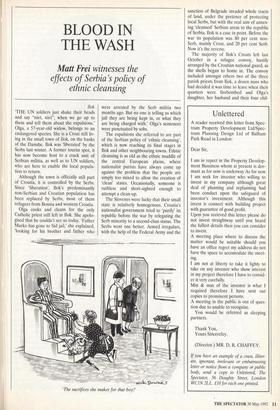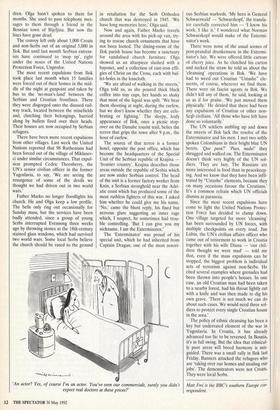BLOOD IN THE WASH
Matt Frei witnesses the
effects of Serbia's policy of ethnic cleansing
Ilok `THE UN soldiers just shake their heads and say "niet, niet", when we go up to them and tell them about the expulsions.' Olga, a 57-year-old widow, belongs to an endangered species. She is a Croat still liv- ing in the small town of Ilok, on the banks of the Danube. Ilok was 'liberated' by the Serbs last winter. A former tourist spot, it has now become host to a crack unit of Serbian militia, as well as to UN soldiers, who are here to enable the local popula- tion to return.
Although the town is officially still part of Croatia, it is controlled by the Serbs. Since 'liberation', Ilok's predominantly non-Serbian and Croatian population has been replaced by Serbs, most of them refugees from Bosnia and western Croatia.
Olga cooks and cleans for the only Catholic priest still left in Ilok. She apolo- gised that he couldn't see us today. 'Father Marko has gone to Sid jail,' she explained, `looking for his brother and father who were arrested by the Serb militia two months ago. But no one is telling us which jail they are being kept in, or what they are being charged with.' Olga's sentences were punctuated by sobs.
The expulsions she referred to are part of the Serbian policy of 'ethnic cleansing', which is now reaching its final stages in Ilok and other neighbouring towns. Ethnic cleansing is as old as the ethnic muddle of the central European plains, where nationalist purists have always come up against the problem that the people are simply too mixed to allow the creation of `clean' states. Occasionally, someone is ruthless and short-sighted enough to attempt a clean-up.
The Slovenes were lucky that their small state is relatively homogenous. Croatia's nationalist government tried to `purify' its republic before the war by relegating the Serb minority to a second-class status. The Serbs went one better. Armed irregulars, with the help of the Federal Army and the 'The sacrifices she makes for that boy!' sanction of Belgrade invaded whole tracts of land, under the pretence of protecting local Serbs, but with the real aim of annex- ing 'cleansed' Serbian areas to the republic of Serbia. Ilok is a case in point. Before the war its population was 80 per cent non- Serb, mainly Croat, and 20 per cent Serb. Now it's the reverse.
The majority of Ilok's Croats left last October in a refugee convoy, hastily arranged by the Croatian national guard, as the shells began to home in. The convoy included amongst others two of the three parish priests from Ilok, a dozen nuns who had decided it was time to leave when their quarters were firebombed and Olga's daughter, her husband and their four chil- dren. Olga hasn't spoken to them for months. She used to pass telephone mes- sages to them through a friend in the Bosnian town of Bijeljina. But now the lines have gone dead.
The convoy left only about 1,000 Croats and non-Serbs out of an original 5,000 in Ilok. But until last month Serbian extrem- ists have continued to 'mop up', right under the noses of the United Nations Protection Force, Unprofor.
The most recent expulsions from Ilok took place last month when 15 families were forced out of their homes in the mid- dle of the night at gunpoint and taken by bus to the 'no-man's-land' between the Serbian and Croatian frontlines. There they were disgorged onto the disused rail- way track, located between the minefields and, clutching their belongings, hurried along by bullets fired over their heads. Their houses are now occupied by Serbian refugees.
There have been more recent expulsions from other villages. Last week the United Nations reported that 98 Ruthenians had been forced out of the village of Miklusev- ci under similar circumstances. That expul- sion prompted Cedric Thornberry, the UN's senior civilian officer in the former Yugoslavia, to say, 'We are seeing the resurgence of some of the devils we thought we had driven out in two world wars.'
Father Marko no longer floodlights his church. He and Olga keep a low profile.
The bells only ring out occasionally for Sunday mass, but the services have been badly attended, since a group of young Serbs interrupted Evensong three weeks ago by throwing stones at the 18th-century stained glass windows, which had survived two world wars. Some local Serbs believe the church should be rased to the ground in retaliation for the Serb Orthodox church that was destroyed in 1945. 'We have long memories here,' Olga said.
Now and again, Father Marko travels around the area with his pick-up van, try- ing to rescue church ornaments that have not been looted. The dining-room of the Ilok parish house has become a sanctuary for vandalised church furniture. Olga showed us an altarpiece slashed with a bayonet, and a collection of cast-iron effi- gies of Christ on the Cross, each with bul- let-holes in the loincloth.
`We are afraid of walking in the streets,' Olga told us, as she poured thick black coffee into tiny cups, her hands so shaky that most of the liquid was spilt. 'We hear them shooting at night, during the curfew, but we don't know whether they are cele- brating or fighting.' The sleepy, leafy appearance of Ilok, once a picnic stop- over on the Danube tourist trail, belies the terror that grips the town after 9 p.m., the hour of curfew.
The source of that terror is a former hotel, opposite the post office, which has become the headquarters of the Special Unit of the Serbian republic of Krajina 'frontier country'. Krajina describes those areas outside the republic of Serbia which are now under Serbian control. The head of the unit is a former factory worker from Knin, a Serbian stronghold near the Adri- atic coast which has produced some of the most ruthless fighters of this war. I asked him whether he could give me his name. `No,' came the blunt reply, his fixed but nervous glare suggesting an inner rage which, I suspect, he sometimes had trou- ble controlling. 'But I can give you my nickname. I am the Exterminator.'
The 'Exterminator' was proud of his special unit, which he had inherited from Captain Dragan, one of the most notori-
'An actor? Yes, of course I'm an actor. You've seen our commercials, surely yOu didn't expect real doctors at these prices?'
ous Serbian warlords. 'My hero is General Schwarzwald' — `Schwarzkopf,' the transla- tor carefully corrected him — 'I know his work. I like it.' I wondered what Norman Schwarzkopf would make of the Extermi- nator's work.
There were none of the usual scenes of post-prandial drunkenness in the Extermi- nator's lair. We were offered little cartons of cherry juice. As he clutched his carton and sucked the straw he told us about the `cleansing' operations in Ilok. 'We have had to weed out Croatian "Ustashe" ele- ments, of course, wherever we find them. There were six fascist agents in Ilok. We didn't kill any of them,' he said, looking at us as if for praise. 'We just moved them physically.' He denied that there had been any expulsions of Croatian or other non- Sec!) civilians. 'All those who have left have done so voluntarily.'
The UN soldiers ambling up and down the streets of Ilok lack the resolve of the Exterminator and his men. I met two softly spoken Colombians in their bright blue UN berets. `Que pasa?"Pues, nada!' they shrugged and walked on. The Exterminator doesn't think very highly of the UN sol- diers. 'They are lazy. The Russians are more interested in food than in peacekeep- ing. And we know that they have been infil- trated by "Ustashe" elements, because they on many occasions favour the Croatians.' It's a common refrain which UN officials dismiss as paranoia.
Since the most recent expulsions have come to light the United Nations Protec- tion Force has decided to clamp down. One village targeted for more 'cleansing' has been surrounded by UN forces, with multiple checkpoints on every road. Jim Lubin, the UN's civilian affairs officer who came out of retirement to work in Croatia together with his wife Diana — 'our chil- dren thought we were mad' — told me that, even if the mass expulsions can be stopped, the biggest problem is individual acts of terrorism against non-Serbs. He cited several examples where grenades had been thrown into people's houses. In one case, an old Croatian man had been taken to a nearby forest, had his throat lightly cut with a knife and was then made to dig his own grave. 'There is not much we can do about such cases. We would need three sol- diers to protect every single Croatian house in the area.'
The policy of ethnic cleansing has been a key but underrated element of the war in Yugoslavia. In Croatia, it has already advanced too far to be reversed. In Bosnia, it's in full swing. But the idea that ethnical- ly pure areas will breed harmony is mis- guided. There was a small rally in Ilok last Friday. Banners attacked the refugees who are 'taking over our homes and stealing our jobs'. The demonstrators were not Croats. They were local Serbs.
Matt Frei is the BBC's southern Europe cor- respondent.

















































 Previous page
Previous page